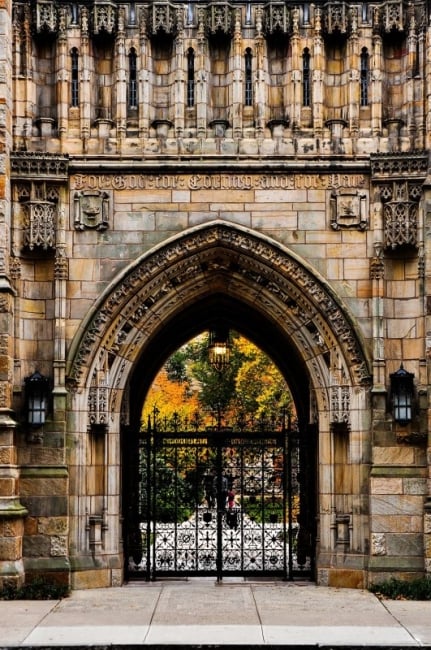You have /5 articles left.
Sign up for a free account or log in.

Yale University
Wikipedia
Yale University announced with some fanfare in 2015 that it was devoting $50 million over five years to faculty diversity.
Three-plus years later, all 13 tenured professors who serve one of the university’s most diverse majors are withdrawing their labor from that program.
In a resignation announcement Friday, the faculty members said they can’t adequately serve the 87 declared majors in ethnicity, race and migration studies, or ER&M, under their current circumstances. The professors, who all have permanent appointments in other departments, say they lack the autonomy and resources that Yale has promised them time and again.
Yale disagrees with the professors’ assessment, saying that the program’s faculty size has enjoyed a “high rate of growth” and that the university “greatly values” ER&M.
The professors -- who say they essentially volunteer their time to ER&M -- won’t leave the program immediately. They intend to do what they can to help current junior and senior majors graduate on time. But Yale’s statement of its support for the program doesn’t match the facts, they say. And if nothing changes, the program will have no tenured professors serving it by 2020.
For more than 15 years, “faculty members have held dozens of meetings with upper administrators regarding the status of the ER&M program, emphasizing that the president and others should not expect faculty to volunteer their labor to support the academic unit,” reads the professors’ announcement. “In 2011, 2015 and 2016 the university president, the provost and the dean of the faculty repeatedly promised to change the status and funding of the program, but those promises were not kept.”
Yale’s program on race, ethnicity and migration was established in 1997 and has grown significantly in enrollments and numbers of majors in recent years. That’s due in part to Yale’s increasingly diverse student body and the rise of these key issues in discourses national and international. But Yale has failed to materially recognize that growth, professors say.
Because ER&M has no tenured faculty of its own, for example, professors say it’s a constant scramble to make sure that required courses for the major are staffed and that enough electives are offered. Similarly, professors in the program have no say in the tenure and promotion decisions of their colleagues, which all happen in their home departments.
“Even having this group of 13 tenured faculty contributing to ER&M our students don’t have a full set of courses in this program,” said Alicia Schmidt Camacho, program chair and professor of American studies. “We are not meeting the needs of majors because our faculty are overtaxed and performing labor across the university, principally because there is a shortage of people with our expertise and faculty of color.”
Echoing research demonstrating that professors of color are called up disproportionately (and without compensation) to mentor students of color and perform other diversity-related service tasks, the professors say they’re stretched thin beyond their research and teaching -- in ways that hurt students.
Stephen Pitti, onetime program chair and professor of history and American studies (and Camacho's partner), has served ER&M since it began. Pitti said that the growth of the major has of course been positive. Yet “the program has lost literally dozens of contributing faculty over the last 20 years, faculty who volunteered their labor to the program but did not see their efforts rewarded by the university.”
President Peter Salovey said in a statement that the university greatly values the work of faculty colleagues in the program, and regrets “their decision to withdraw from it, and in this manner.”
Yale “will make sure that affected students are given the resources and support they need, and we remain hopeful that an agreement can be reached that works well for everyone,” he said.
Last year Yale hired two new senior professors into the ER&M program and expects to hire two additional senior faculty members this year, Salovey said. That’s “a very high rate of growth, in keeping with the five-year, $50 million effort the university has undertaken to improve the diversity and excellence of its faculty.”
In that initiative’s first three years, he added, Yale has hired more than 60 new professors across campus, “who bring diversity and excellence to our ranks.”
Salovey said it’s his “great hope we can discuss the future of ER&M in a spirit of collegiality: the program and its wonderful students deserve no less.”
Still, professors in the program say university statistics about the program are short on transparency -- such as where the new professors are going on campus. Daniel Martinez HoSang, associate professor of American studies, came to Yale in 2017 and is presumably one of recent ER&M hires to which Salovey referred. But HoSang said that while his appointment letter said he’d split his time between American studies and ER&M, the university now lists him as an American studies professor with a courtesy appointment in political science.
The lack of clarity surrounding his appointment is a source of ongoing confusion, he said -- especially because his prior institution, the University of Oregon, had crystalline policies about how he was to split his time between appointments, and on tenure and promotion criteria for teaching, research and service in each program.
“Having worked for an institution like that for 10 years, coming to an institution where internal documents contradict each other on these key issues, it’s pretty shocking, frankly,” HoSang said.





